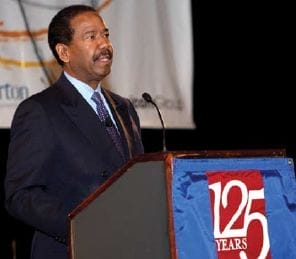Wharton isn’t the only beneficiary of Fountain’s time. In 2006 Crain’s Detroit named Frank Fountain the region’s number-one “most connected” person—the local leader who had forged the most connections through civic and nonprofit board service. For Fountain, who is DaimlerChrysler’s Group Senior Vice President of External Affairs and Public Policy, being connected is part of his job. But it’s also who he is.
Fountain was born in 1944 in Brewton, AL, as the oldest of seven children in a struggling farm family. He learned early the benefits of “working hard and working smart,” attributes that helped him to earn a bachelor’s degree in history and political science in 1966 from Virginia’s Hampton University. From 1966 to 1968, he served in the Peace Corps in West Bengal, India — a pivotal experience that he calls “intense, challenging, sometimes painful, but always inspiring.” His work there helped farmers produce a recordbreaking rice harvest and introduced handicraft makers to marketing.
By 1973, after returning to the U.S., Fountain earned his Wharton MBA, and then landed a job at Chrysler as an investment analyst. By 1995 he was appointed vice president for government affairs, ascending to the position of senior vice president after the 1998 merger of Daimler-Benz and Chrysler Corp. As president of the DaimlerChrysler Corporation Fund, Fountain oversees the distribution of more than $20 million in grants annually, aimed at developing a skilled workforce, ensuring community vitality, and encouraging employee involvement.
Six years after graduation, Fountain first reconnected with the School to help his company’s recruiting efforts. Then in 1989, he became a leader in the Wharton African American MBA Association’s effort to endow a professorship in the name of Whitney M. Young. Since that success, he became more deeply involved with the School, eventually becoming a member of Wharton’s Board of Overseers. And he is vocal about the need for such a commitment.
Fountain advises other alumni to engage with the School in multiple ways—donating money, recruiting talent, working with Wharton Alumni Clubs, and encouraging their companies to become involved with the School’s research centers and Executive Education. He recalls that several years ago, DaimlerChrysler was reconsidering the provider of its custom executive leadership education.
“There was a list of six competing schools, and Wharton wasn’t one of them,” Fountain says. He ensured that Wharton had a chance to compete for the business, and Wharton Executive Education ultimately won the contract on its merits in an intense competition with another school.
In his private life, Fountain is busy on many boards, especially those that support the Detroit community, including Detroit Public Schools, and development and health care in Africa, including the Corporate Council on Africa and Africare, which address HIV-AIDS and other issues. Among his many competing responsibilities, Wharton ranks high on his priorities.
“Wharton is part of my heritage,” he says. “I think that my original investment in Wharton has to be protected, nurtured, and enhanced, because Wharton represents so much of who I am and who I became professionally.”

























